Global learning programs can be enriching experiences to expand your world, develop new skills and reflect on your home, culture and identity. There is no one experience of Indigenous students in global education, and this page offers a wide array of information and resources. Here, you can find a list of institutions currently partnered with UBC that offer Indigenous programming and studies, as well as supports for Indigenous students to help choose a destination for potential exchange. We also outline important safety considerations and tips for taking care of your physical, mental and spiritual health while overseas.
This list is a work in progress which we update annually to reflect UBC and Go Global's current partnerships. Applications for the 2026/27 Academic Year are now open.
Opportunities for Indigenous students at UBC
International Institute for Indigenous Peoples' Rights and Policy - APPLY NOW!
This program is presented by a partnership of the Munk School of Global Affairs & Public Policy at the University of Toronto (Canada) and the University of Auckland (New Zealand) together with Columbia University Institute for the Study of Human Rights (ISHR), the University of British Columbia and Docip Indigenous Peoples’ Centre for Documentation, Research and Information. An intensive, two-week immersion into Indigenous Peoples' rights, and policy, connecting cutting-edge scholarship with real-world advocacy at the United Nations in Geneva. Participation in the 19th session of the Expert Mechanism on the Rights of Indigenous Peoples (EMRIP) in Geneva, Switzerland will be preceded by a week-long intensive immersion program providing an overview and analysis of the major questions in Indigenous affairs and their emergence.
For more information on the program, its methodology and the application process, please visit: International Institute for Indigenous Peoples' Rights and Policy | Indigenous Policy
Timeline
- Summer 2026
Costs
- Go Global application fee $431.50
- The cost of this 2 week program is $3,000 USD
- This includes tuition and some meals
- It does not include accommodations or flights to Geneva
The International Institute for Indigenous Peoples’ Rights and Policy offers optional housing arrangements in Geneva for the duration of the program. The additional housing cost is approximately US$900 per person in shared hostel accommodation and includes a public transportation pass in Geneva and a light breakfast.
Funding
- Go Global is providing 2 awards of $4,500 CDN to students for this program.
- Students may apply directly to the program without applying to Go Global for the Indigenous Peoples' Rights and Policy Award
- Successful applicants will receive the award in May 2026 and will need to cover the costs of the program upfront before being reimbursed
Eligibility for Award
- Minimum 70% cumulative average
- Students from all Faculties and disciplines are welcome to apply
- Priority for students who identify as First Nations, Métis or Inuit
To apply for the Award
Complete a Go Global application through Gateway.
- Under the “Search Experiences” tab, search “Indigenous Peoples' Rights” in the “Keywords” section
- Select 2026 Summer to begin an application
You will need to submit:
- A letter of introduction
- A CV
- The names of two referees whom you plan to ask for reference letters
The deadline to apply for the Indigenous Peoples' Rights and Policy International Summer Program Award is February 1, 2026.
You must also submit an application directly to the program by February 1, 2026.
Tūrangawaewae, Pōkai Whenua: University of Otago - Applications closed
Tūrangawaewae, Pōkai Whenua (A place to stand, a world to explore) is a unique student exchange built on kanohi-ki-te-kanohi (face-to-face) relationships established between mana whenua and Indigenous representatives of universities throughout the world.
Through this program, Indigenous students participate in an Exchange with the University of Otago, taking a full course load at their host university. Students receive priority access to housing on campus at Otago and are welcomed at Indigenous events, conferences, sports teams and social outings in Dunedin. There will also be opportunities to participate in local events and engage with the community. The program adds new dimension to traditional exchange, introducing students to contemporary life and culture within local Indigenous communities and offering students deeper transnational engagement to provide new perspectives on local and global issues.
Timeline for 2026/27 Academic Year
- Term 1 start (July-November 2026) - option for Single Term or Full Year
- Term 2 start (February-June 2027) - option for Single Term or Split Year
Funding
- Eligible students will receive a $5,000 Go Global Award for a Single Term Exchange or a $10,000 Award for a Full Year or Split Year Exchange.
- The TPW award is paid out at the start of the UBC Term (i.e. If your program begins in July, your award will be issued at the start of UBC Term 1 in September)
- If you are participating in a Full Year or Split Year Exchange the $10,000 award will be dispersed equally at the beginning of each team (i.e. $5,000 at the start of Term 1 and $5,000 at the start of Term 2)
- The total annual funding for this program is $20,000. Up to 4 single term candidates will be selected or 2 Full-Year/Split Year candidates.
Eligibility
- This program is open to Indigenous undergraduate students, including Law
- Minimum 70% cumulative average
- Students from all Faculties and disciplines are welcome to apply
- Endorsement from home faculty is required
- Students must hold Canadian citizenship or Permanent Residency to receive funding
To apply
1. Complete a Go Global application through Gateway.
- Under the “Search Experiences” tab, search “Otago” in the “Keywords” section
- Select the Tūrangawaewae, Pōkai Whenua pathway which will bring up the application
- Select which term7 you would like to be abroad and complete your application.
- This is a Go Global application and you have the option to select additional universities you would like to be considered for, for Exchange.
2. Complete the supplementary application on Qualtrics to be considered for the Indigenous Exchange program at Otago and funding for this program: https://ubc.ca1.qualtrics.com/jfe/form/SV_3JCI0oM4dAsapV4.
The deadline to apply is December 10, 2025 (11:59PM).
UBC-Monash University Indigenous Leaders Program - Applications closed
Information session: November 6, 2025 12:00pm-1:00pm | Zoom - Information slides
UBC-Monash University’s Indigenous Leaders Program extends beyond traditional academic boundaries to incorporate first-hand learning experiences with Indigenous peoples in Narrm, Melbourne. The program offers a unique opportunity of visiting Monash University in Australia where Indigenous students learn about historic examples of Indigenous leadership in Australia that have laid the foundation for positive change. Students will embark on an educational journey, visiting significant cultural and historical sites to deepen their understanding of Aboriginal and Torres Strait Islander communities. This includes interactive sessions with community leaders, artists, and scholars, aimed at fostering a comprehensive appreciation of Indigenous cultures and leadership models. The program aims to foster mutual understanding, promote cultural appreciation, and create lasting connections between Indigenous students from the William Cooper Institute and Indigenous students from The University of British Columbia.
Students are expected to actively contribute to the program's objectives by engaging in cross-cultural dialogues, enhancing their academic and personal growth. Pre-departure workshops online and in-person will provide essential background information, ensuring all students are well-informed and ready to maximize their learning experience.
Timeline
- Pre-Departure Programming in-person and online: 2-4 workshops between February-April
- In Country Experience in Australia: June 9 - 25, 2026
UBC Staff Support
The students will be accompanied by staff members from UBC Vancouver and Okanagan campuses.
Student eligibility
Eight UBC undergraduate students will be selected to participate; 4 from UBC Vancouver and 4 from UBC Okanagan.
Go Global Eligibility Requirements:
- This program is for students who self-identify as First Nations, Métis or Inuit
- Undergraduate students from any faculty are eligible to apply
- Year 2 standing or higher (including students finishing their degree requirements and graduating in May)
- Students who have received major funding for another international program through Go Global are not eligible to receive funding for this program (e.g. Corbett Fellowship, Choquette Award, GSO funding, ARA funding)
Funding
This program is funded by the Indigenous Strategic Initiatives Fund. The following costs will be covered by the program:
- Flights
- Accommodation
- Group meals
- Excursions and cultural activities
Students will be responsible for the costs of:
- Passport and visa acquisition fees
- Travel insurance
- Meals outside of the group
- Incidentals
How to apply
Complete the application online through Go Global's Gateway system. Go to "Search Experiences" and search "Monash" scroll to this program and press "Apply for" and select "Summer" to start an application. The heart of this program is sharing world views and experiences. Successful applicants will have strong listening skills and a willingness to share their perspectives with others. In your application you will be asked to respond to questions relating to:
- Your motivation for joining this program
- Your leadership experience and community involvement
- Previous experience working on a team or in a group setting
Application Process
Students will first complete a written application that is due November 30.
Short-listed applicants will be invited for an in-person or Zoom interview (see questions here).
Deadline to apply: Sunday November 30, 2025 (11:59pm)
Resources for Inbound Indigenous students
The First Nations Longhouse
- The Longhouse is a welcoming space for Indigenous students, serving as a hub to access Indigenous programs and services, socialize, and study.
- It includes the šxʷta:təχʷəm Collegium that supports Indigenous students in building and fostering community – a home away from home.
- Indigenous Student Lunches are hosted every Tuesday during the semester, sponsored by UBC units offering support to Indigenous students.
- First Nations Longhouse website here.

Community Resources
- Personal campus tour provided during first week of the semester.
- Calendar of events with Indigenous focused activities during the semester will be
updated every month. - Connection to Indigenous Peer Advisor within their home faculty.

Housing
- Indigenous Exchange students receive priority access to housing.
- Campus residents have easy access to beaches, recreational activities, theatre, restaurants and special interest clubs.
- Residence Advisors help connect students with resources and support services and organize fun opportunities for students to get involved in.
Mental Health Support
Counselling services is committed to a process of Indigenizing and decolonizing mental health services at UBC. Indigenous exchange students have access to mental health services at the First Nations Longhouse including:
- Free and confidential drop-in and brief counselling services
- Planning sessions to help you meet difficult challenges while attending UBC, including how to locate a doctor or find community resources like a daycare
- Mentoring from professional staff
- Connections with community resources that encourage wellbeing
FNIS & FNEL Courses
- First Nations and Indigenous Studies (FNIS) courses provide students with an understanding of the histories, contemporary realities and political concerns of Indigenous peoples in Canada and beyond. List of UBC FNIS courses here.
- First Nations and Endangered Languages (FNEL) offers courses in First Nations Languages, as well as methodology classes on language documentation, conservation and revitalization. List of UBC FNEL courses here.
- Musqueam language courses are taught at Musqueam Cultural Centre on the Musqueam Reserve.
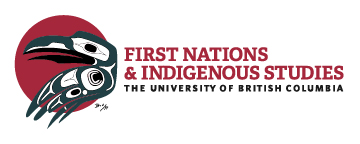
Indigenous Spaces on Campus
- The X̱wi7x̱wa Library is your centre for academic and community Indigenous
scholarship on the Vancouver campus. For more information click here. - The xʷc̓ic̓əsəm Garden at the UBC farm supports land-based teaching, research, and community engagement on food security and traditional plant knowledge. For more information click here.

The Museum of Anthropology houses world arts with a special emphasis on the First
Nations peoples and other cultural communities of British Columbia, Canada. For more information click here.
Indigenous Student Experience
Aidan Downey's Story
Indigenous exchange student Aidan Downey dives head-first into UBC life—and finds connection
Expect ‘a safe and welcoming community across Indigenous spaces,’ says the undergrad from Sydney, Australia
June 2, 2025
Some university students spend a semester abroad and keep to themselves. It can be intimidating, stressful and, at times, lonely. They might gravitate towards other international students and keep securely within their comfort zones or just stay in their room and study. Aidan Downey decided to get involved.
He joined societies, attended events and community lunches, and spent time getting to know others in the First Nations Longhouse and šxʷta:təχʷəm student space. To learn more about Indigenous culture during his time on the UBC Vancouver campus, Aidan attended beading and drumming workshops run by Indigenous students that he found pretty amazing.
An Indigenous exchange student from Sydney, Australia’s Macquarie University, Aidan is a Wiradjuri man, who has grown up on Kuringgai country, and says that at UBC he found “some of my closest friends that I’ll welcome for life.” We spoke to Aidan about his experience.
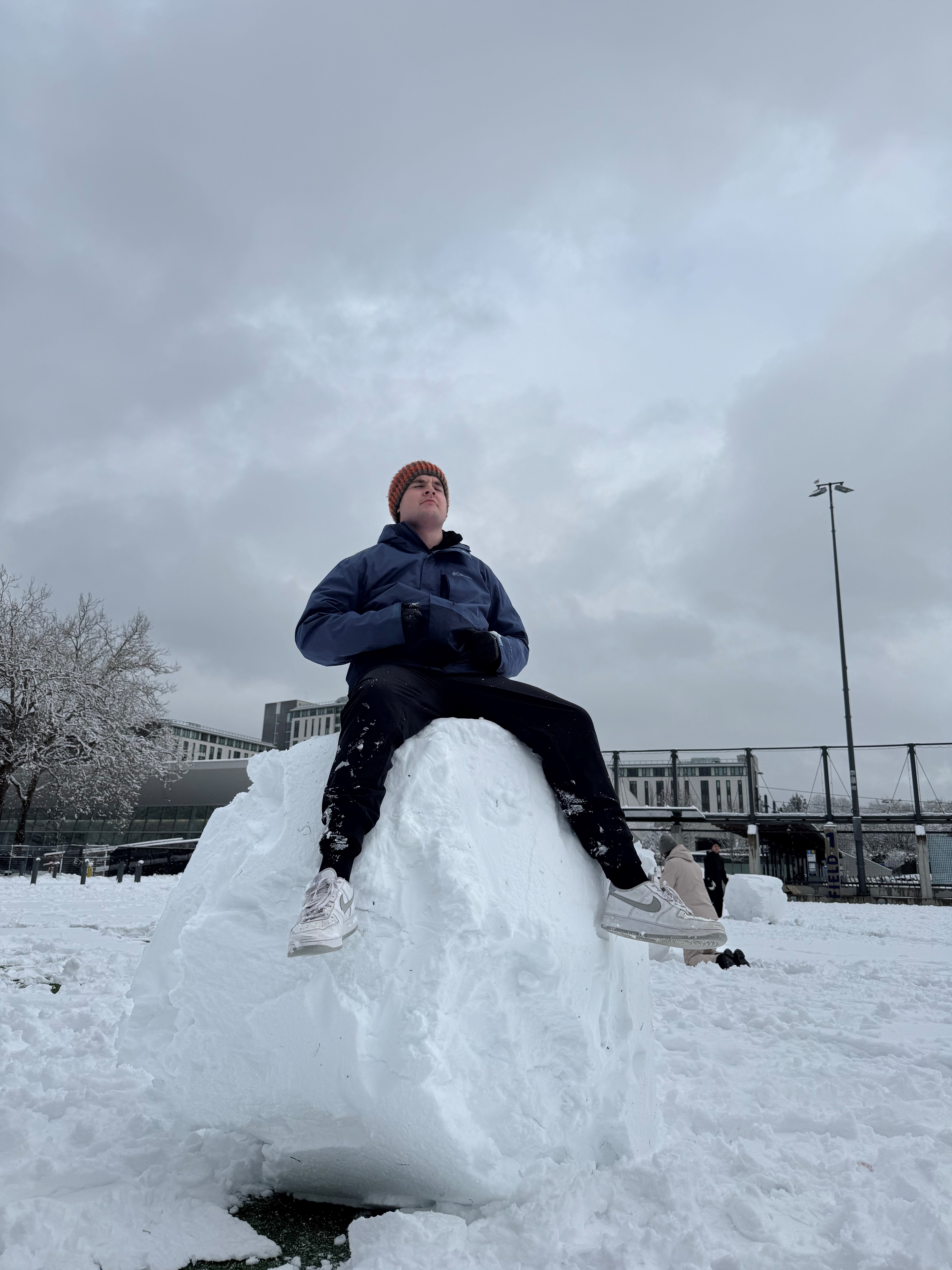
UBC exchange student Aidan Downey on the Vancouver campus: Says Aidan, "On the first snow day of the year, I decided wholeheartedly to take full advantage of the snow. I eventually convinced my roommate to come out and we both learned how to make snowmen and roll snowball to an impossible size. I truly enjoyed this time since I found very quickly how cool two of my roommates were, but also the different shapes I could make out of snow." (photo: Aidan Downey)
Why did you choose UBC for exchange?
For a few reasons: First, a couple of years back in my second year of university, we had two Indigenous students come on exchange to Macquarie University from the University of Victoria (in BC). In meeting them, it got me hooked on the idea of an exchange in Canada: living in an unfamiliar environment, but also in space where most students were in a similar situation on exchange.
Second, going forward, I want to pursue further education in Critical Indigenous Studies. Through research into universities, UBC’s status as a top 50 university, and its diverse offerings in Critical Indigenous Studies units, drew me towards Vancouver. Lastly, I was truly drawn in by UBC’s international credibility as an exchange space—with very diverse and broad social and cultural offerings for exchange students, and specifically, the Indigenous spaces which throughout my exchange I felt welcomed into.
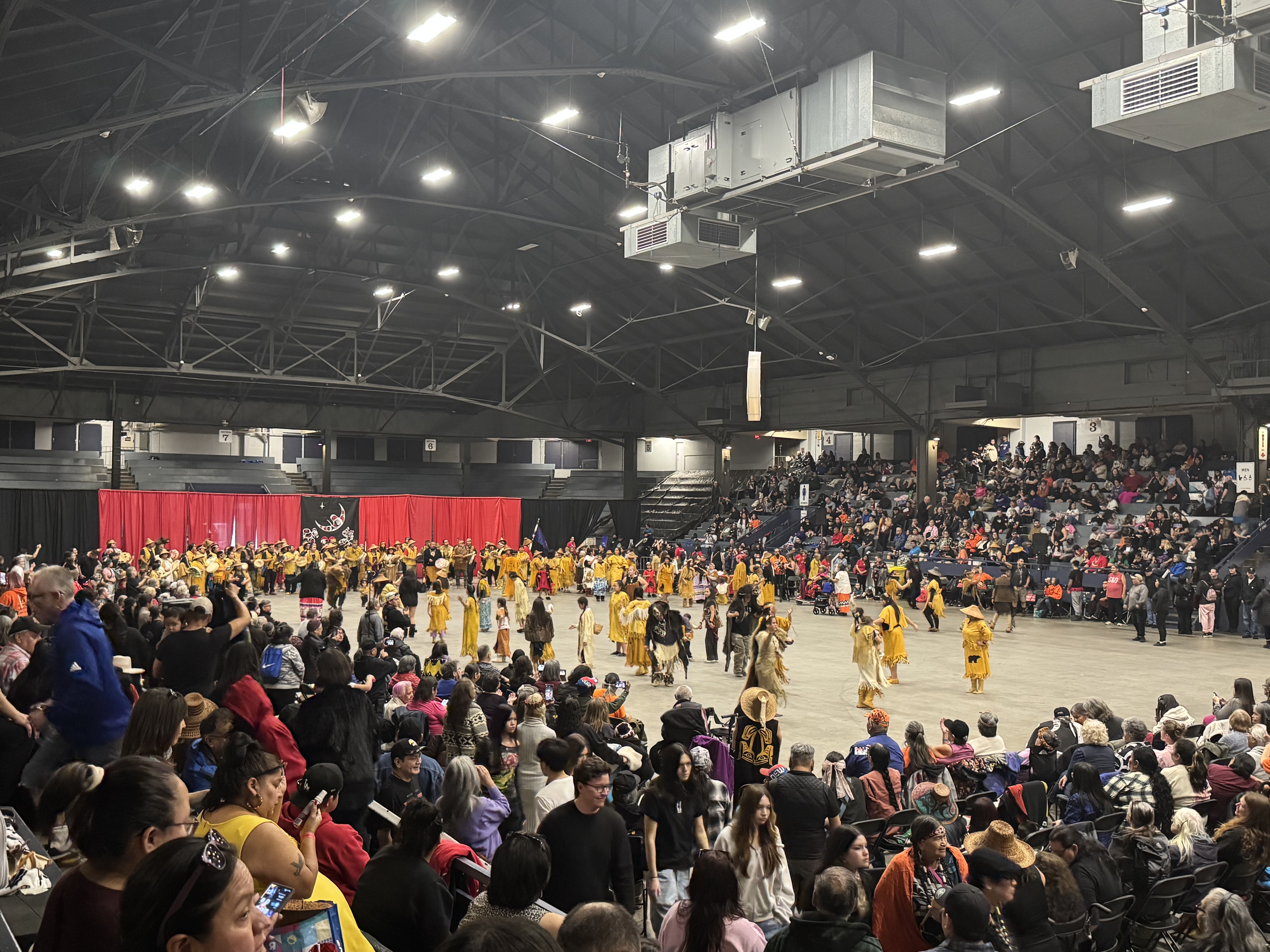
Says Aidan: "I took this picture during Hoobiyee at the Vancouver PNE Forum on March 1 when I went with a bunch of friends. Hoobiyee is a cultural and spiritual festival that marks the arrival of the first crescent moon in February. It features dancing, drumming, feasting and crafts, and helps Nisga'a people connect with their identity and heritage. I attended to experience and immerse myself in the event—seeing all the markets and dances performed by First Nations from across the province. I also got to pick up some presents for home to hand out and hang out with friends the whole day. I truly appreciated the time spent learning and watching an event where First Nations gather similar to events back home such as a Corroboree or the Koori Knockout. (photo: Aidan Downey)
What was it like?
Throughout the term, I found studying at UBC has been one of the most enriching experiences in my degree. Through my studies, I found the freedom to explore my passions and interests, which were embedded into the learning outcomes. I found that the professors advocated for a sense of freedom through empowering students’ desire to critically think outside of assignments and exams, enabling students to explore critically, openly discuss and freely create questions that both challenged and developed upon topics and ideas.
This didn’t feel contained within classrooms, either, but also spread across the campus, where I’d find students actualizing their interests and passions through clubs, chats at cafés and even sitting on the grass in front of the AMS Nest.
Throughout my exchange, UBC also provided me the flexibility and space in my studies to expand my social connection with students at UBC. There was time and flexibility in my academics to explore and engage in cultural and social activities across Vancouver: from attending events, such as Hoobiyee and Powwows at UBC and Edmonton, to weekday hanging out with mates studying, and on the weekends heading out with friends to Granville Island and downtown Vancouver.
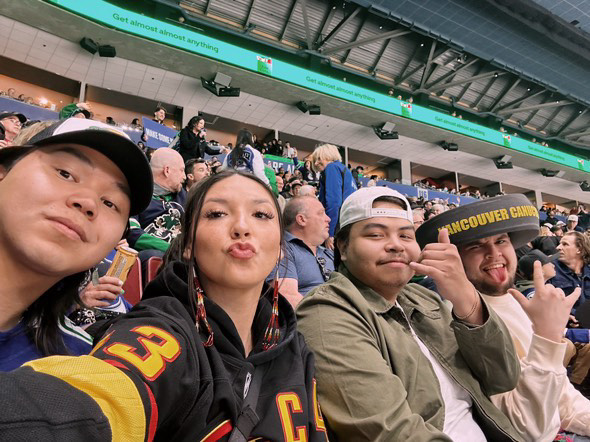
From left: Friends Toryn, Bianca, Owen and Aidan Downey at the last Canucks home game of the season for fan appreciation night April 16. Says Aidan, "We decided to go as a group to go see Bianca's first Canucks game, but also my second, and most likely last, in-person hockey game for a while." (photo: Bianca Mckay)
What’s different compared to your home uni?
I found that UBC truly encourage students to pursue freedom—not as a way of expression, but self-empowerment of themselves and the communities they interact with—by equipping them with the tools to create social networks and groups empowered to change the world. I’ve seen this through the Sauder School of Business students who wear business suits to class; Arts students who critically analyze the colonial structures of institutions and discourses; but also the general population, organizing student activities across the campus to create genuine connections and spaces of comfort for incoming students. One of the biggest examples comes from the Longhouse, šxʷta:təχʷəm student space and also the Indigenous Student society, whose members welcomed me into their community.
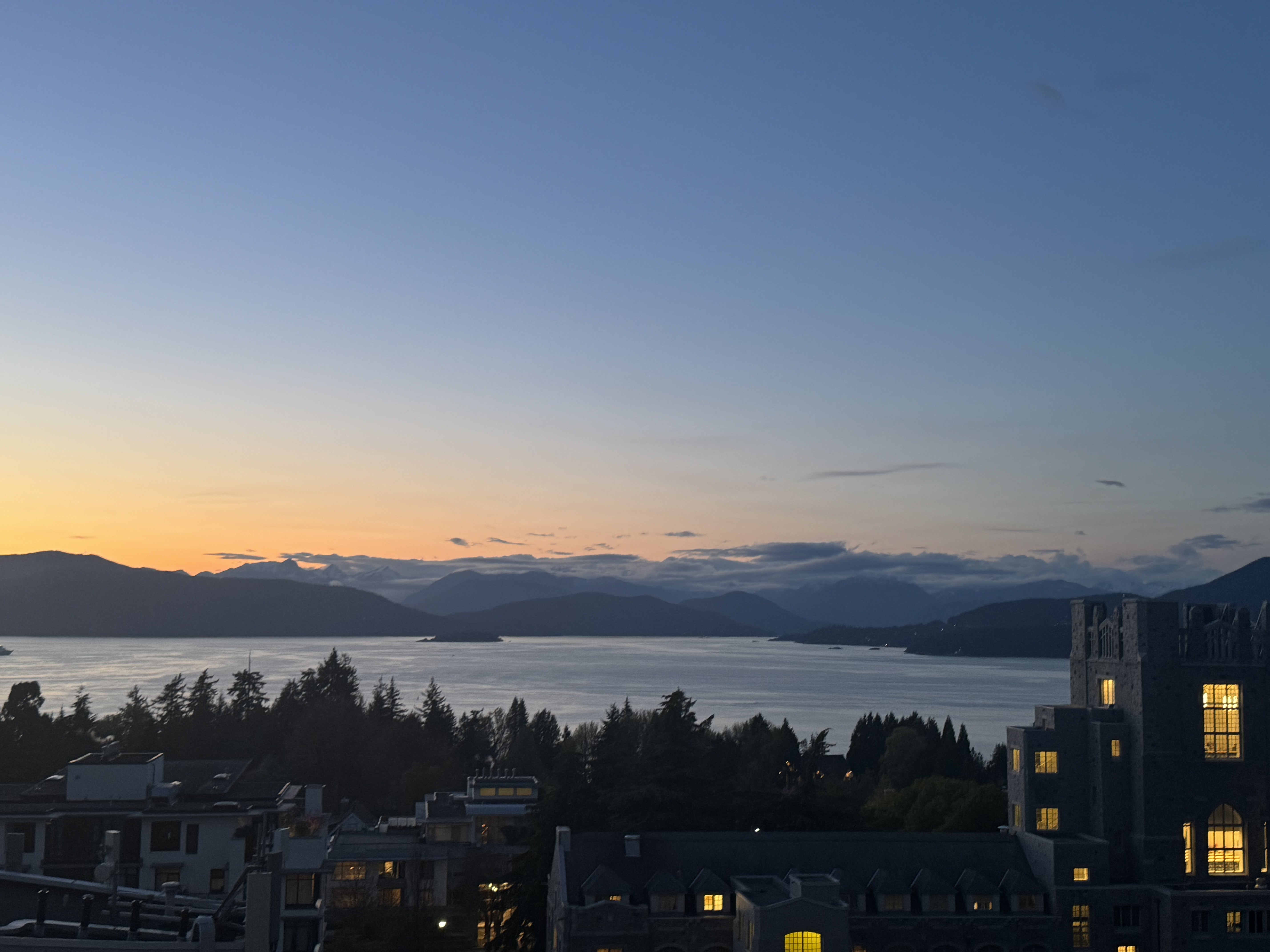
Walter Gage Apartments on the UBC Vancouver campus. Says Aidan: "This was the second-to-last week of university and I had been spending a lot more time with friends in Walter Gage, hanging out and chatting the night away. You can get amazing views from Walter Gage and I always appreciate the memories from staying there for the semester." (photo: Aidan Downey)
What can other Indigenous students expect?
They can expect a safe and welcoming community across the Indigenous spaces that is both passionate and caring towards their studies and relationships. There were a multitude of spaces I could go to—including the Longhouse, Indigenous Student Society, Arts Indigenous Student Advising—across campus that contribute to the Indigenous community as a whole. But also, by engaging in these spaces, I found that the Indigenous students and staff were passionate in creating an inclusive space to revitalize and empower cultural practices: by creating workshops, such as beading night, drum circle or weekly community lunch, to encourage participation and the creation of a strong community. Some of my closest friends that I’ll welcome for life came from these spaces. The random yap sessions that I’ve had with students have positively impacted my life going forward.
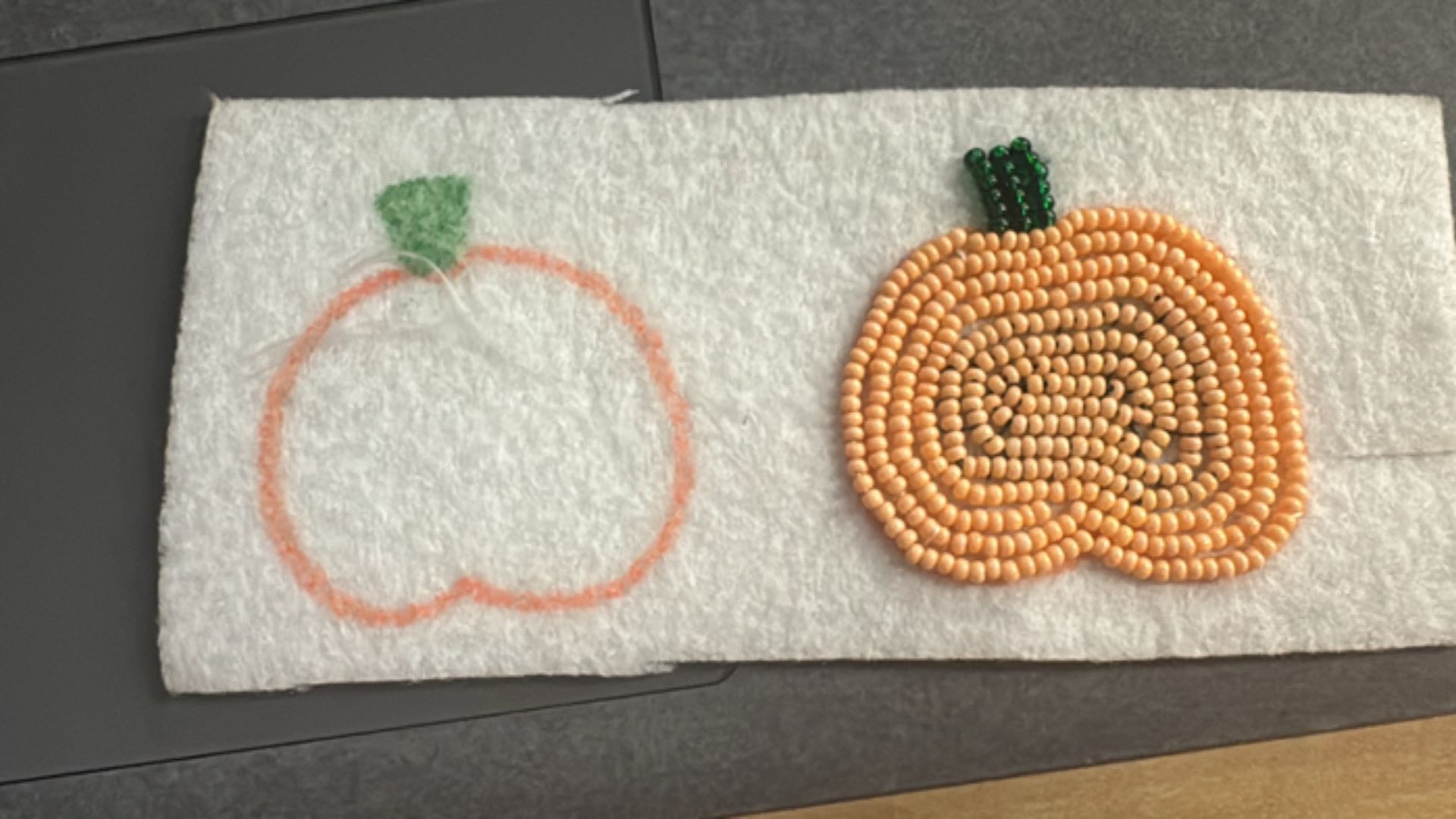
Aidan's bead work. He says: "Across the semester, I would always invest my Mondays well in making the best decisions to learn how to bead at the šxʷta:təχʷəm student space with Nenaa'ikiizhikok and Annellie, who were both the first people in the space I interacted with and taught me how to bead in a deadly way. The beading circles meant a lot to me—to both learn through the two amazing people they are, and also from the other deadly individuals who attended weekly and I had the opportunity to talk to. I learned how to bead over the semester, and enjoyed every moment and needle prick through my fingers." (photo: Aidan Downey)
What would you do differently if you could do it over?
Not much, really. One thing I would’ve done differently, though, is understand how time flies so quickly by taking advantage of the good days. Instead of sitting at home “studying,” I should’ve been out exploring Vancouver and engaging with the student clubs to meet new friends. Though it’s provided me a really solid reason to come back, I definitely would’ve tried to make use of weekends and free time a bit more—even if I wasn’t prepared for it yet—by myself exploring Vancouver: trying all of its delicious food and beautiful hikes across the landscape.
What are some activities you recommend?
Across UBC I found so many different ways to interact with students—whether through clubs that would host game nights, or events and workshops. Throughout my time at UBC, I mostly engaged in Indigenous workshops held by the Longhouse, the šxʷta:təχʷəm student space and the Indigenous Student Society. That’s where I met close friends and engaged in cultural activities and spaces of knowledge to learn more.
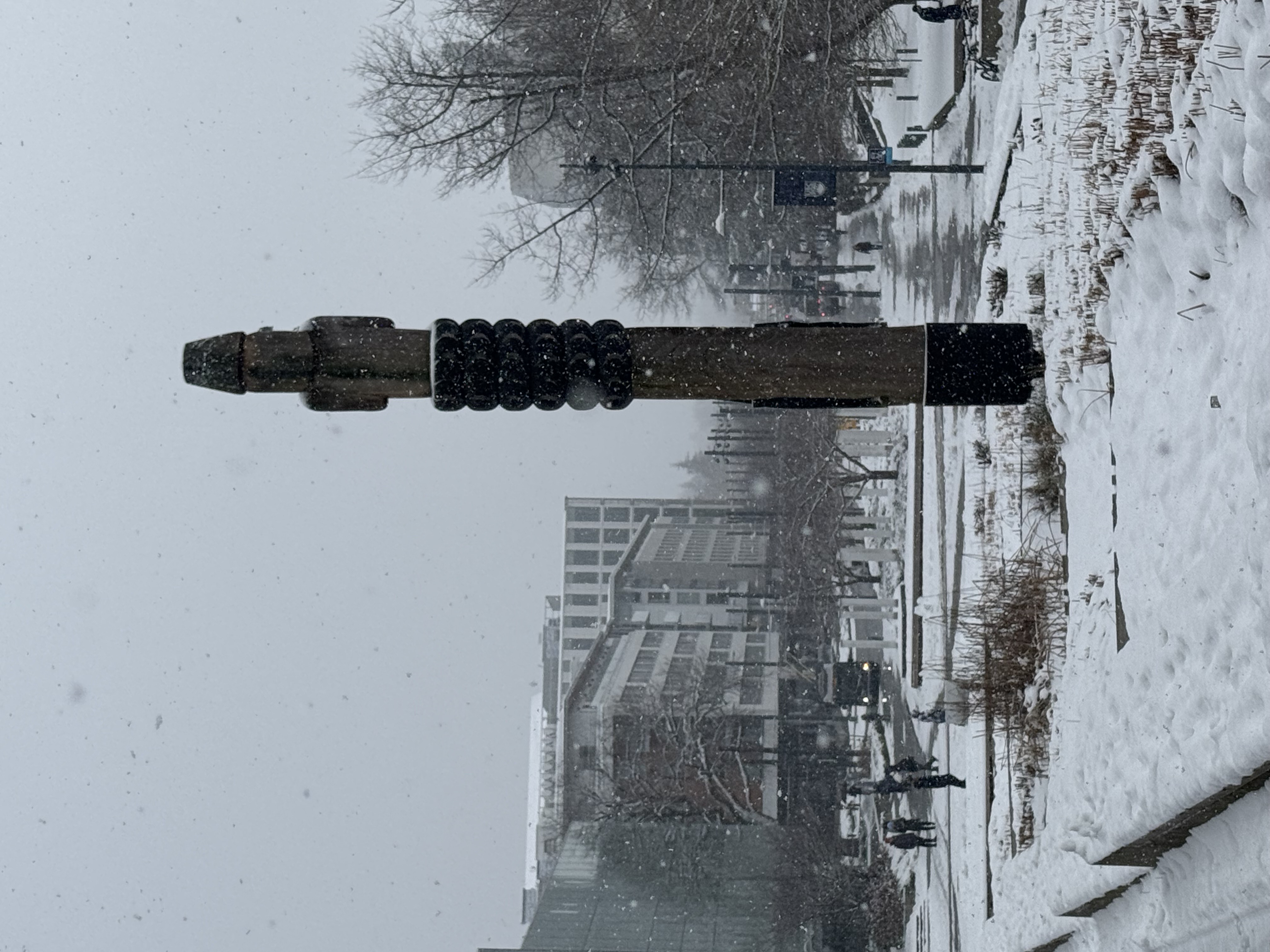
Musqueam sʔi:ɬqəy̓ qeqən (double-headed serpent post): The Musqueam Post in front of The Nest on the UBC Vancouver campus. Says Aidan: "This picture was taken in February during my first time seeing snow in my life. I spent a lot of time walking around feeling the emotions across the days. I found a couple of spots, but feel most connected to this spot: as a site of cultural significance across UBC, but also I'm fond of it because it's a pretty good picture." (photo: Aidan Downey)
What did you learn about yourself?
I learned a lot at UBC. I found myself actually enjoying the structure of learning, providing me the freedom to explore my interests, but also how much I enjoy hanging out with people. I quickly learned how much I love to yap my friends off, but also what it means to be mates with people just walking together down Wreck Beach or going downtown to explore or party in the city mostly to The Roxy.
Anything else?
I want to emphasize that while on exchange at UBC, I realized that everyone is in a similar situation. At my home university, I found many people come from around the area; in comparison to UBC, where I found people from all across the world living away from home—and wanting friendships and experiences to not only make the most out of the experience, but also to create an environment that feels like home. That has created some of the closest connections I’ve made with people so far along the way.
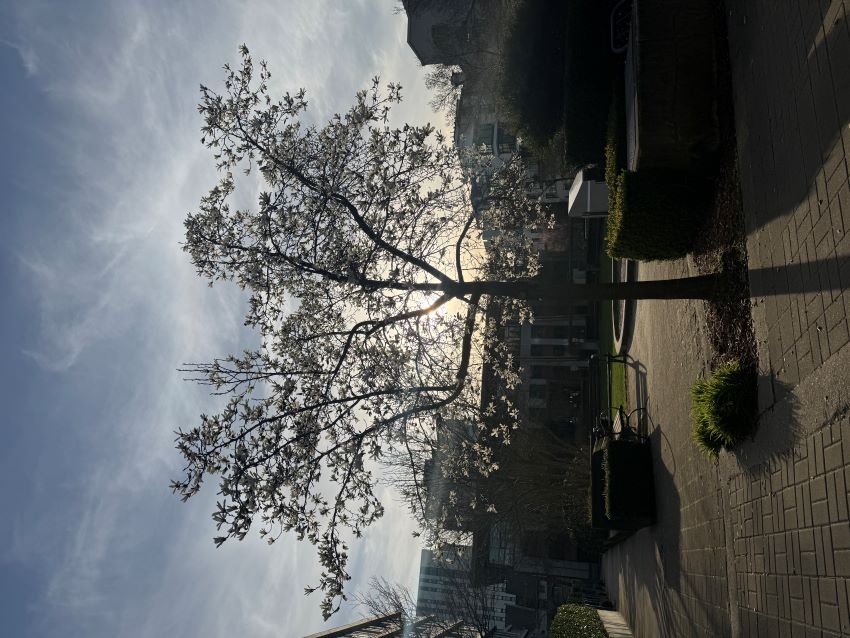
In April, Aidan saw his first cherry tree in blossom—in a square next to Walter Gage Apartments (photo Aidan Downey)
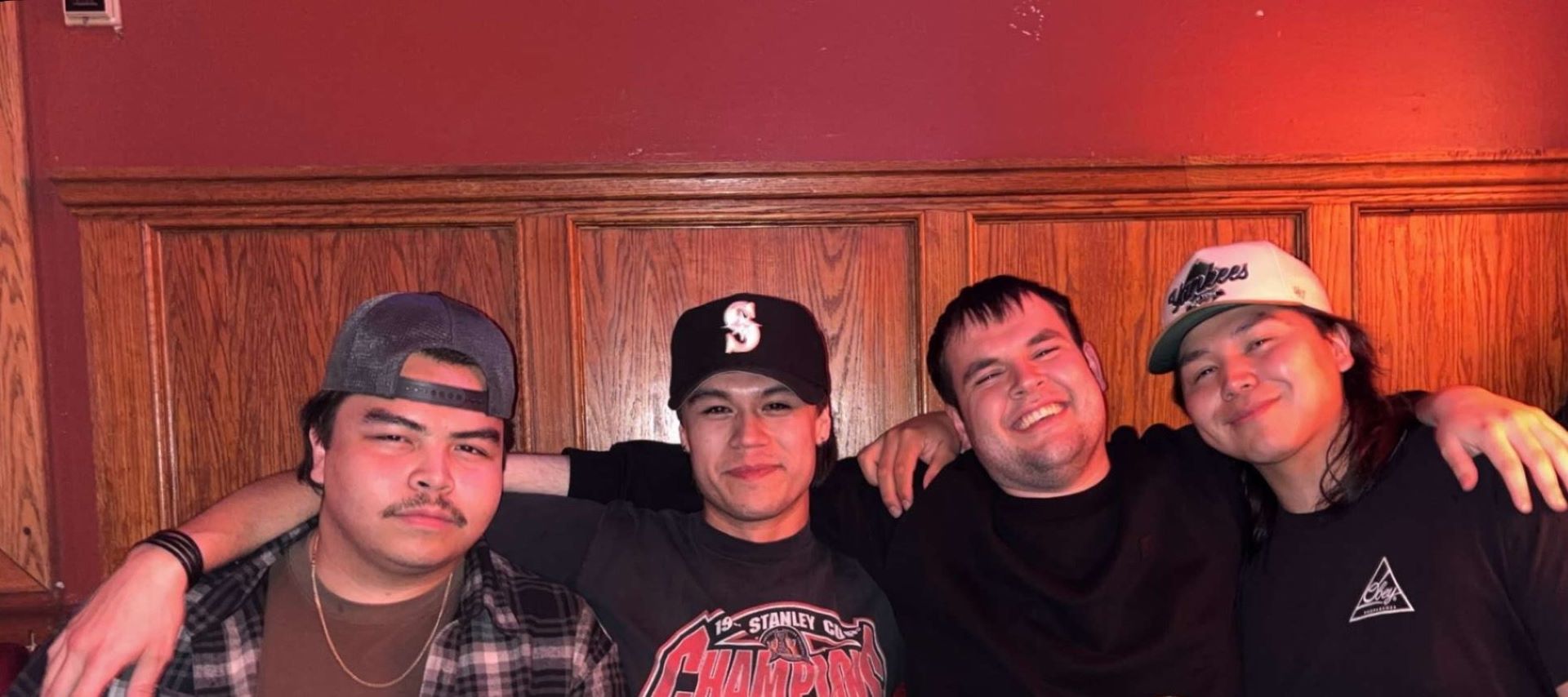
From left: Friends Owen, Niigonii, Aidan, and Toryn on April 26, the second-to-last day of school enjoying "one last night out with the lads to say final good-byes and have a good time to remember" at the Roxy in downtown Vancouver (photo: Aidan Downey)
For questions about Go Global Indigenous Programs, please contact Eyobe Melketsadik at eyobe.melketsadik@ubc.ca
You can book an appointment to meet in person or online through the following link: https://calendly.com/eyobe/goglobal
